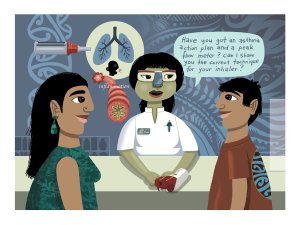Academic pharmacist Nataly Martini discusses the medical management of asthma in adults and adolescents, which has evolved to prioritise early anti-inflammatory treatment. She also explains how to improve patient outcomes by proactively identifying poor asthma control and supporting equitable access to education and treatment
Parties go head to head on mental health
Parties go head to head on mental health

The Green Party and National want a new minister in charge of mental health, ACT wants a new mental health and addiction agency, and Labour wants to train 12 more psychiatrists a year.
These were some of the promises for mental health services from representatives of the four parties at the mental health & addiction 2023 election political debate hosted by Atamira Platform last night at Wellington College.
The debate, MC’d by RNZ journalist Guyon Espiner, featured ACT deputy leader Brooke van Velden, Green Party mental health and drug reform spokesperson Chlöe Swarbrick, Labour health minister Ayesha Verrall and National mental health spokesperson Matt Doocey.
Ms Swarbrick and Mr Doocey said they wanted a new minister to oversee mental health and constantly drive towards improving mental health outcomes.
Mr Doocey said great progress had been made in changing attitudes to mental health in New Zealand society; a lot of the stigma had been removed.
People are not afraid to ask for help, he said, but when people decide to reach out, “the services aren’t there”.
The health minister focuses on physical health, but a mental health minister would provide “a voice” and has proven effective in Australia, Mr Doocey said.
Ms Swarbrick said the Government needs to “pump a lot of money” into mental health service but also the underlying drivers of poor mental health, such as poverty. It’s frustrating that other parties are not willing to address these problems, she said.
Dr Verrall agreed the social determinants need to be addressed and said her Government has achieved a lot in the mental health space, although there is a lot left to do.
She pointed to the rollout of the Access and Choice Wellbeing Support programme to more than a million people, creating a Māori health authority and banning conversion therapy. This progress would be at risk under a National and ACT Government, Dr Verrall said.
Ms van Velden outlined ACT’s mental health policy – to create a new mental health and addiction agency to oversee the mental health sector and commission services based on data about effectiveness of services.
The proposed agency will be funded by the $2 billion per annum currently spent on mental health through the Ministry of Health and Te Whatu Ora.
The agency also could be paid for from the proceeds of crime, Ms van Velden said. Dr Verrall said the proceeds from that fund were small in the context of the Government’s total spend on health.
ACT has proposed tax cuts but Ms van Velden said the party has “never said we will cut health”.
She refused to say whether she agreed poverty is a major driver of poor mental health, instead saying mental health issues are caused by a range of factors; different people have different levels of resilience. The latter comment was not well received by the audience.
All speakers agreed work needs to be done to address the mental health sector’s ongoing workforce shortages.
Both Ms Swarbrick and Mr Doocey said pay and conditions need to be improved and Mr Doocey said there needs to be a new unit in the Ministry of Health dedicated to forecasting workforce needs.
Dr Verrall said the Government is taking action and recent pay equity agreements for nurses have improved conditions for many working in mental health. Asked by an audience member whether these agreements would be extended to all mental health service providers, Dr Verrall said this was an area for future work.
She said Labour, if re-elected, would improve the workforce pipeline for psychiatrists by increasing the number of psychiatrists trained per year from 26 to 38.
Ms Swarbrick advocates a consistent and evidence-based approach to managing all drugs, including alcohol, repeal and replacement of the Misuse of Drugs Act 1975, and removing the profit motive from these substances.
Mr Doocey does not support decriminalisation or legalisation of drugs, adding some people need a “line in the sand” to know a behaviour is wrong.
Ms van Velden supported decriminalising drug users and providing them addiction support services but cracking down on drug suppliers. She was against Ms Swarbricks’ proposal to ban advertising of alcohol because “people need to have free choice”.
Dr Verrall said Labour would not be making any further moves towards decriminalisation of drugs but its advice to prosecutors to exercise discretion in these cases remains in place.
The full debate will be available to be viewed online.








